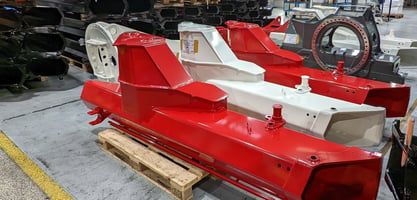Sales configurators are online tools that allow customers to build and customize their own products...
Sales Configurator vs. CPQ Configurator: Which One Is Right for You?
Companies continually search for ways to optimize sales processes and boost customer experiences. While sales configurators and CPQ configurators are often considered powerful tools to achieve these goals, it can be challenging to determine which one is the best fit for your business. In this blog post, we delve into the key differences between the two and examine the benefits of each solution, helping you make an informed decision for your company.
Navigating Complex Sales Processes and Inefficient Quoting
Today's sales landscape is growing more complex as customers demand tailored products and services to meet their unique needs. Consequently, businesses face the challenge of managing intricate product configurations, calculating precise prices, and generating timely quotes. These tasks can be time-consuming and error-prone, leading to lost sales opportunities and diminished customer satisfaction.
The Importance of a Robust Sales Solution
Traditional sales methods may struggle to keep up with these demands, whereas a robust sales solution can significantly enhance efficiency and accuracy. Companies that fail to implement such a solution risk falling behind competitors and losing valuable customers. Sales configurators and CPQ configurators come into play here, offering advanced features that automate and optimize the sales process.
Understanding the Sales Configurator and CPQ Configurator
Sales Configurator: A sales configurator is a tool that simplifies creating custom product configurations based on customer requirements. It enables sales representatives to quickly and accurately generate product configurations, particularly beneficial for businesses with a large variety of products or complex product offerings. However, sales configurators typically lack advanced pricing and quoting capabilities.
CPQ Configurator: A CPQ (Configure, Price, Quote) configurator is a more comprehensive solution that not only assists with product configuration but also manages pricing and quoting processes. CPQ configurators integrate advanced pricing algorithms and customizable rules, enabling sales representatives to generate accurate quotes based on product configurations, discounts, and other pricing factors. Furthermore, CPQ configurators often seamlessly integrate with CRM and ERP systems, offering a unified sales platform for enhanced efficiency and data accuracy.
Choosing the Right Solution for Your Business
When deciding between a sales configurator and a CPQ configurator, consider these factors:
-
Complexity of Product Offerings: A CPQ configurator may be more suitable for businesses with a wide range of products or complex product offerings, as it can handle both product configurations and pricing.
-
Pricing and Quoting Needs: For businesses requiring advanced pricing and quoting capabilities, a CPQ configurator is the better choice, offering a more comprehensive solution compared to a sales configurator.
-
Integration with Existing Systems: If seamless integration with CRM and ERP systems is vital for your business, a CPQ configurator may be more beneficial, often providing better compatibility and data synchronization.
-
Scalability: As your business grows, your sales solution should adapt to increasing demands. CPQ configurators are generally more scalable, making them a suitable option for businesses anticipating growth or expansion.
In conclusion, sales configurators and CPQ configurators can both significantly enhance your sales process and improve customer satisfaction. Sales configurators are ideal for businesses needing a simple product configuration tool, while CPQ configurators offer a more comprehensive solution covering configuration, pricing, and quoting. By carefully considering your business's unique needs, you can select the best solution to drive success and growth in today's competitive market.
It's essential to note that CPQ configurators and sales configurators can be considered synonyms in some contexts, as both solutions aim to streamline the sales process and enhance customer experiences. Nonetheless, in this article, we focused on the potential differences between the two to help businesses identify the solution that best aligns with their unique needs and objectives. We hope that exploring the varying features and benefits offered by each configurator type provides a clearer perspective for decision-makers seeking to optimize their sales processes and ultimately drive growth and success.




